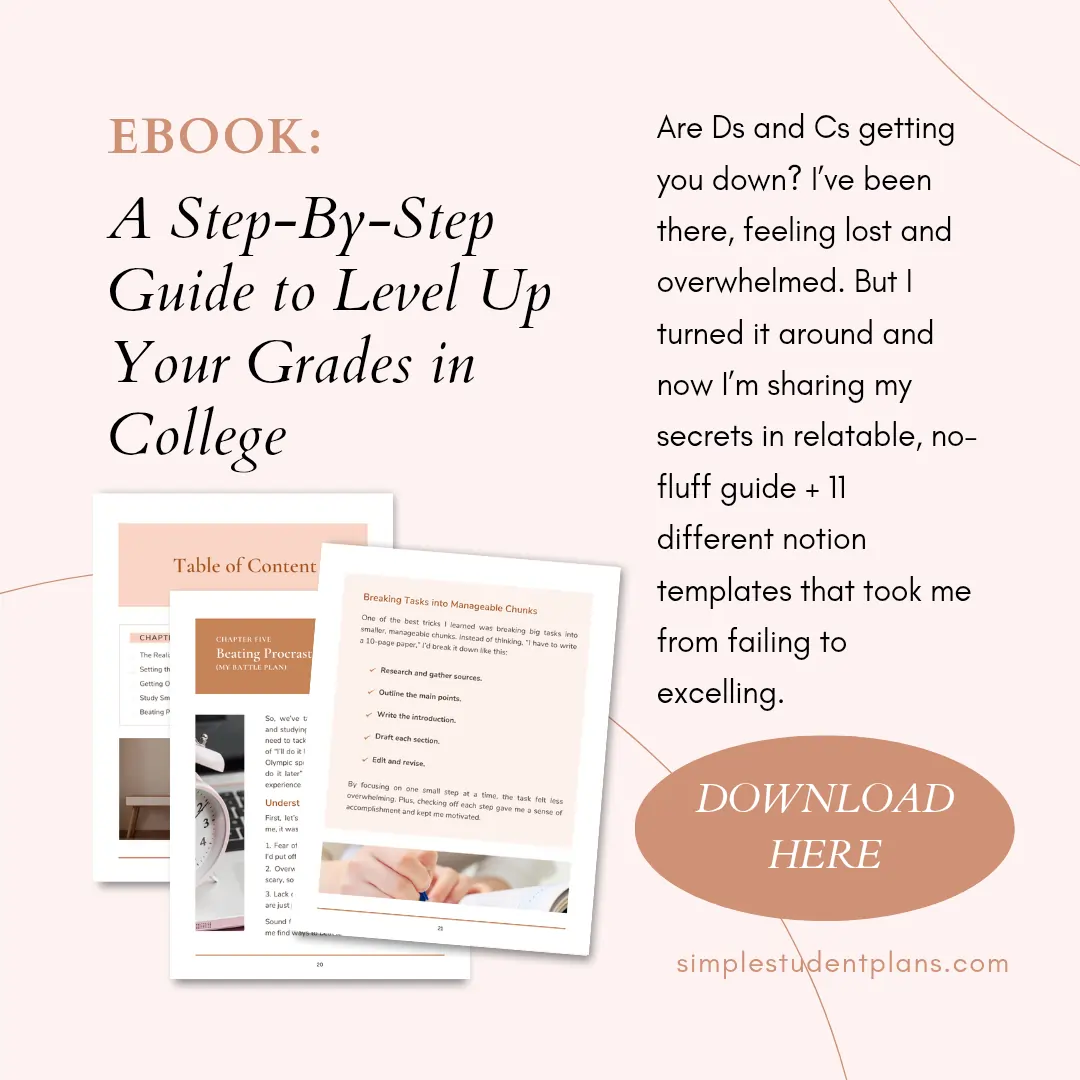Starting a new semester often feels like opening a fresh notebook, clean, exciting, and full of possibilities. But let’s be honest: no matter how motivated we are in the first week, staying consistent with productivity throughout the semester can be tough. Between classes, assignments, social life, and maybe even a part-time job, things pile up fast.
As an affiliate partner of various brands and sponsored content, SimpleStudentPlans may earn commission on qualifying purchases. Disclaimer | Advertise With Us
That’s where a productivity challenge comes in. A productivity challenge isn’t about working harder every second of the day. Instead, it’s about testing small habits, building consistency, and learning what works best for you. When you commit to a challenge, you give yourself structure, accountability, and a fun way to improve your daily routine.
In this post, we’ll discuss 10 productivity challenges you can try this semester. Each challenge is practical, beginner-friendly, and flexible enough to fit your student lifestyle. Whether you want to get better at managing your time, reducing distractions, or staying organized, you’ll find something here that works for you.
Let’s dive in!
Why Productivity Challenges Work
Before we get into the actual challenges, let’s quickly talk about why these little experiments can be game-changers:
- They build habits through consistency. Instead of vague goals like “I’ll be more productive this semester”, challenges give you specific actions to practice daily.
- They make productivity fun. Turning self-improvement into a challenge feels more like a game and less like homework.
- They help you learn what works. You might discover that a 25-minute Pomodoro study session works better than 1-hour blocks, or that waking up earlier gives you more mental clarity.
- They create accountability. When you set a clear challenge (and maybe even share it with a friend), you’re more likely to stick with it.
Think of them as short experiments that help you unlock your personal productivity style.
The 10 Productivity Challenges
Here are ten challenges designed specifically with students in mind. You don’t have to do all of them at once. Pick one or two to start, and once they become habits, move on to the next.
1. The 30-Day Time-Blocking Challenge
What it is:
Time blocking means planning your day in chunks of time instead of making a simple to-do list. Each block is dedicated to one type of task; studying, gym, lectures, rest, etc.
How to do it:
- At the start of each day, open Google Calendar or a paper planner.
- Divide your day into 1–2 hour blocks.
- Assign each block a task (e.g., 9–11 AM: Review biology notes).
- Stick to the plan as much as possible.
Why it works:
It forces you to be intentional with your time and reduces decision fatigue. Instead of wondering “What should I work on now?”, you’ll already know.
Pro tip: Try Notion or Google Calendar to create digital time blocks you can drag and drop.
2. The 25-Day Pomodoro Sprint
What it is:
The Pomodoro Technique is a famous productivity method where you study for 25 minutes, then take a 5-minute break. After four rounds, you take a longer 15–30 minute break.
How to do it:
- Pick a task.
- Set a 25-minute timer (you can use the Focus To-Do app).
- Work without distractions.
- Take a 5-minute break. Repeat.
Why it works:
Short bursts of focus are easier to sustain than marathon study sessions. It also helps if you tend to procrastinate.
Challenge yourself: Try doing four Pomodoro sessions per day for 25 days straight.
3. The Digital Detox Challenge (7 Days)
What it is:
Limit your use of distracting apps and social media for a week.
How to do it:
- Use app blockers like Freedom or Forest.
- Turn off unnecessary notifications.
- Set specific times to check social media (e.g., only 20 minutes at night).
Why it works:
Phones are one of the biggest productivity killers. Cutting back helps you stay focused and more present in your work.
Pro tip: Replace scrolling time with something refreshing, like a quick walk, journaling, or a podcast.
4. The “No All-Nighters” Challenge (Semester-Long)
What it is:
Commit to never pulling an all-nighter this semester.
How to do it:
- Stick to a bedtime routine.
- Review notes daily instead of cramming.
- Use flashcards apps like Quizlet for small, frequent study sessions.
Why it works:
Research shows that sleep improves memory, focus, and problem-solving. By protecting your sleep, you’ll perform better academically and feel healthier.
5. The Morning Routine Challenge (21 Days)
What it is:
Set a consistent morning routine for 21 days.
How to do it:
- Wake up at the same time daily.
- Do something energizing: stretching, journaling, or a quick workout.
- Avoid checking your phone for the first 30 minutes.
- Plan your top three priorities for the day.
Why it works:
A strong morning routine sets the tone for a productive day. Instead of rushing, you’ll start calm and in control.
6. The 10-Minute Declutter Challenge (14 Days)
What it is:
Spend just 10 minutes a day decluttering your workspace or digital files.
How to do it:
- Day 1: Clean your desk.
- Day 2: Organize your backpack.
- Day 3: Sort through old class notes.
- Day 4: Delete unnecessary files on your laptop.
Why it works:
A messy space = a messy mind. Keeping things organized helps reduce stress and saves you time when searching for materials.
7. The “Top 3 Priorities” Challenge (30 Days)
What it is:
Instead of overwhelming yourself with endless to-dos, pick just three key priorities each day.
How to do it:
- Each morning, write down your top three tasks.
- Work on them first before anything else.
- Treat everything else as bonus productivity.
Why it works:
This challenge teaches you to focus on what truly matters, not just staying busy.
8. The 1-Hour Deep Work Challenge (30 Days)
What it is:
Dedicate at least one uninterrupted hour daily to deep work—serious studying or project work with zero distractions.
How to do it:
- Silence your phone.
- Use noise-canceling headphones or ambient study music.
- Tell friends/roommates you’re not available for that hour.
Why it works:
Deep work helps you produce high-quality results in less time compared to multitasking.

9. The Note-Taking Method Challenge (14 Days)
What it is:
Test out different note-taking methods for 2 weeks to see which improves your retention and organization.
Methods to try:
- Cornell Method
- Outline Method
- Mind Mapping
- Digital notes with Notion or OneNote
Why it works:
Strong notes make exam prep 10x easier. This challenge helps you find the best method for your learning style.
10. The Accountability Partner Challenge (Semester-Long)
What it is:
Pair up with a friend or classmate to keep each other accountable.
How to do it:
- Share your weekly goals.
- Check in once or twice a week.
- Celebrate wins and help each other stay on track.
Why it works:
When someone else is counting on you, you’re more likely to show up and stay consistent.
How to Choose the Right Challenge
Not every productivity challenge will fit your lifestyle. Here are a few tips for choosing the right one:
| Challenge Type | Best For | Commitment | Tools Needed |
|---|---|---|---|
| Time-Blocking | Students with busy schedules | Daily | Planner/Calendar |
| Pomodoro | Procrastinators or easily distracted | 25 days | Timer app |
| Digital Detox | Social media scrollers | 7 days | App blockers |
| No All-Nighters | Chronic crammers | Whole semester | Bedtime routine |
| Morning Routine | Students who feel rushed | 21 days | Alarm clock |
| Declutter | Messy desk warriors | 14 days | None |
| Top 3 Priorities | Overwhelmed multitaskers | 30 days | Notebook |
| Deep Work | Serious project workers | 30 days | Quiet space |
| Note-Taking | Visual/organized learners | 14 days | Notebook/Apps |
| Accountability Partner | Team players | Semester-long | A friend |
My Experience with the Pomodoro Challenge
During my sophomore year, I tried the Pomodoro Challenge for exam prep. At first, it felt silly setting a timer, but I quickly noticed that the urgency made me focus. I couldn’t waste time because the clock was ticking. After a week, I doubled the amount of material I could review in a day. The short breaks also prevented burnout, I’d do a quick stretch or grab water, then come back refreshed. By the end of the semester, it became my go-to study method.
Key Takeaways
- A productivity challenge is a fun and effective way to test new habits.
- Challenges like time-blocking, Pomodoro sessions, and digital detoxing help you stay consistent.
- Not all challenges fit every lifestyle, pick one or two that align with your needs.
- The goal isn’t perfection, it’s building sustainable habits that support your academic and personal growth.
Frequently Asked Questions (FAQ)
1. How long should a productivity challenge last?
Most challenges last between 7–30 days. That’s enough time to test the habit and see if it works for you. Some, like accountability partners or avoiding all-nighters, can last the entire semester.
2. Can I do multiple productivity challenges at once?
Yes but don’t overwhelm yourself. Start with one or two, then layer others in once you feel comfortable.
3. What if I fail a challenge?
It’s not failure, it’s feedback. The goal of a productivity challenge is to learn what works for you. Simply adjust and try again.
4. Do I need special tools for these challenges?
Not at all. While apps and planners can help, most challenges only require discipline and consistency.
Final Thoughts
Trying a productivity challenge is one of the easiest ways to improve your habits this semester. They give structure, accountability, and a sense of fun to self-improvement. Start with one that excites you, stick with it for at least two weeks, and watch how it transforms your daily routine.
Don’t forget: productivity isn’t about doing more, it’s about doing what matters most.
